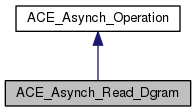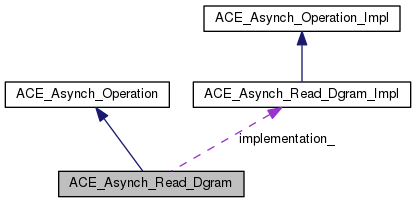This class is a factory for starting off asynchronous reads on a UDP socket. This class forwards all methods to its implementation class.
More...
#include <Asynch_IO.h>
|
| class | Result |
| | This is the class which will be passed back to the {handler} when the asynchronous read completes. This class forwards all the methods to the implementation classes. More...
|
| |
|
| | ACE_Asynch_Read_Dgram (void) |
| | A do nothing constructor. More...
|
| |
| virtual | ~ACE_Asynch_Read_Dgram (void) |
| | Destructor. More...
|
| |
| int | open (ACE_Handler &handler, ACE_HANDLE handle=ACE_INVALID_HANDLE, const void *completion_key=0, ACE_Proactor *proactor=0) |
| |
| ssize_t | recv (ACE_Message_Block *message_block, size_t &number_of_bytes_recvd, int flags, int protocol_family=PF_INET, const void *act=0, int priority=0, int signal_number=ACE_SIGRTMIN) |
| |
| virtual ACE_Asynch_Operation_Impl * | implementation (void) const |
| | Return the underlying implementation class. More...
|
| |
| int | open (ACE_Handler &handler, ACE_HANDLE handle, const void *completion_key, ACE_Proactor *proactor) |
| |
| int | cancel (void) |
| |
| ACE_Proactor * | proactor (void) const |
| | Return the underlying proactor. More...
|
| |
| virtual | ~ACE_Asynch_Operation (void) |
| | Destructor. More...
|
| |
This class is a factory for starting off asynchronous reads on a UDP socket. This class forwards all methods to its implementation class.
Once {open} is called, multiple asynchronous {read}s can be started using this class. An ACE_Asynch_Read_Dgram::Result will be passed back to the {handler} when the asynchronous reads completes through the {ACE_Handler::handle_read_dgram} callback.
| ACE_Asynch_Read_Dgram::ACE_Asynch_Read_Dgram |
( |
void |
| ) |
|
A do nothing constructor.
| ACE_Asynch_Read_Dgram::~ACE_Asynch_Read_Dgram |
( |
void |
| ) |
|
|
virtual |
| int ACE_Asynch_Read_Dgram::open |
( |
ACE_Handler & |
handler, |
|
|
ACE_HANDLE |
handle = ACE_INVALID_HANDLE, |
|
|
const void * |
completion_key = 0, |
|
|
ACE_Proactor * |
proactor = 0 |
|
) |
| |
Initializes the factory with information which will be used with each asynchronous call. If ({handle} == ACE_INVALID_HANDLE), {ACE_Handler::handle} will be called on the {handler} to get the correct handle.
| ssize_t ACE_Asynch_Read_Dgram::recv |
( |
ACE_Message_Block * |
message_block, |
|
|
size_t & |
number_of_bytes_recvd, |
|
|
int |
flags, |
|
|
int |
protocol_family = PF_INET, |
|
|
const void * |
act = 0, |
|
|
int |
priority = 0, |
|
|
int |
signal_number = ACE_SIGRTMIN |
|
) |
| |
This starts off an asynchronous read. Upto {message_block->total_size()} will be read and stored in the {message_block}. {message_block}'s {wr_ptr} will be updated to reflect the added bytes if the read operation is successfully completed. Return code of 1 means immediate success and {number_of_bytes_recvd} will contain number of bytes read. The {ACE_Handler::handle_read_dgram} method will still be called. Return code of 0 means the IO will complete proactively. Return code of -1 means there was an error, use errno to get the error code.
Scatter/gather is supported on WIN32 by using the {message_block->cont()} method. Up to ACE_IOV_MAX {message_block}'s are supported. Upto {message_block->size()} bytes will be read into each {message block} for a total of {message_block->total_size()} bytes. All {message_block}'s {wr_ptr}'s will be updated to reflect the added bytes for each {message_block}
Priority of the operation is specified by {priority}. On POSIX4-Unix, this is supported. Works like {nice} in Unix. Negative values are not allowed. 0 means priority of the operation same as the process priority. 1 means priority of the operation is one less than process. And so forth. On Win32, {priority} is a no-op. {signal_number} is the POSIX4 real-time signal number to be used for the operation. {signal_number} ranges from ACE_SIGRTMIN to ACE_SIGRTMAX. This argument is a no-op on non-POSIX4 systems.
Implementation class that all methods will be forwarded to.
The documentation for this class was generated from the following files:


 Public Member Functions inherited from ACE_Asynch_Operation
Public Member Functions inherited from ACE_Asynch_Operation Protected Member Functions inherited from ACE_Asynch_Operation
Protected Member Functions inherited from ACE_Asynch_Operation 1.8.11
1.8.11